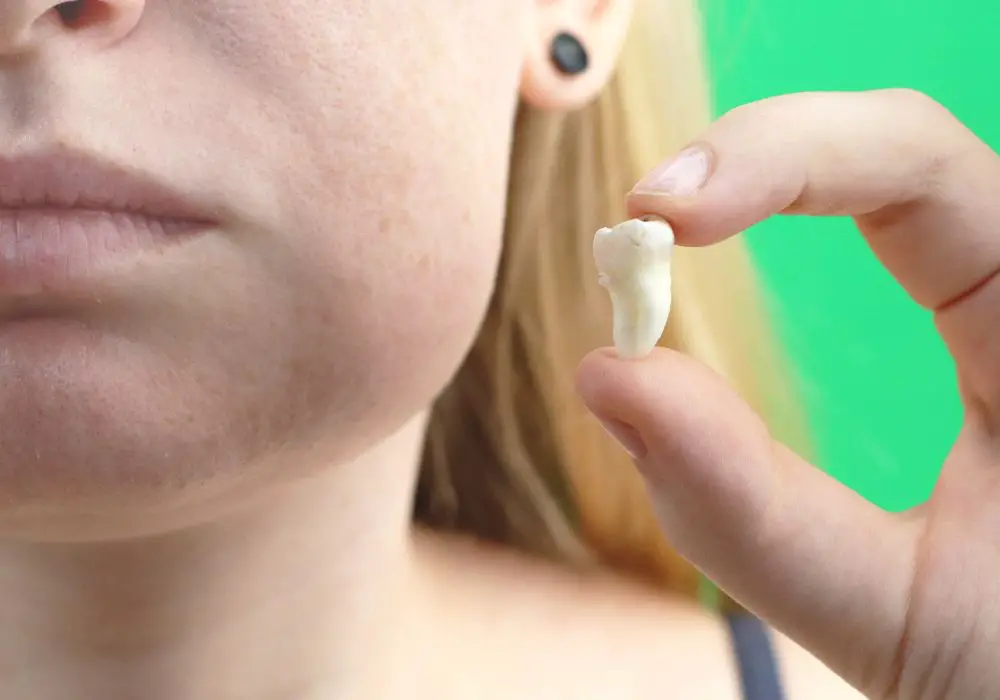If you’re experiencing wisdom teeth swelling, you may be wondering if it’s possible for the swelling to go away overnight. Unfortunately, the answer is not a simple yes or no. The severity of the swelling and the cause of the swelling can play a significant role in how quickly it will go away.
Wisdom teeth swelling is a common occurrence for many people, especially when the teeth are impacted or coming in at an awkward angle. In some cases, the swelling may be mild and go away on its own within a few days. However, if the swelling is severe, it may take longer to go away, and you may need to seek medical attention. In some cases, the swelling may be a sign of an infection, which will require antibiotics to treat.
Understanding Wisdom Teeth Swelling
If you are experiencing wisdom teeth swelling, it is important to understand what is causing it. Wisdom teeth are your third molars, located at the back of your mouth. They usually emerge between the ages of 17 and 25, but not everyone will develop them. When they do emerge, they can cause swelling, pain, and discomfort.
There are several reasons why wisdom teeth can cause swelling. One common reason is that they can become impacted, meaning they do not have enough room to emerge properly. When this happens, they can become trapped under the gum and cause swelling and pain. Another reason why wisdom teeth can cause swelling is due to infection. If bacteria get trapped around the tooth, it can cause an infection, leading to swelling, pain, and discomfort.
It is important to note that wisdom teeth swelling does not typically go away overnight. It may take several days or even weeks for the swelling to go down. In some cases, the swelling may not go away on its own, and you may need to see a dentist or oral surgeon for treatment.
To help reduce wisdom teeth swelling, there are several things you can do. First, try to keep the area clean by brushing and flossing regularly. You can also use a warm saltwater rinse to help reduce inflammation and promote healing. Over-the-counter pain relievers, such as ibuprofen, can also help reduce pain and swelling.
If your wisdom teeth swelling is severe or does not go away on its own, it is important to see a dentist or oral surgeon. They can evaluate the situation and determine if treatment is necessary. In some cases, wisdom teeth may need to be removed to prevent further swelling and discomfort.
Causes of Wisdom Teeth Swelling
If you are experiencing swelling around your wisdom teeth, there could be several causes. Here are some of the most common causes of wisdom teeth swelling:
Impacted Wisdom Teeth
When your wisdom teeth do not have enough space to grow properly, they can become impacted. This means that they are unable to fully emerge from your gums. Impacted wisdom teeth can cause swelling, pain, and infection. If left untreated, impacted wisdom teeth can also lead to gum disease and tooth decay.
Pericoronitis
Pericoronitis is a condition that occurs when the gum tissue around your wisdom teeth becomes inflamed. This can happen when your wisdom teeth are only partially erupted. Symptoms of pericoronitis include swelling, bad breath, and pus. If left untreated, pericoronitis can lead to more serious infections.
Tooth Decay
Tooth decay is a common cause of wisdom teeth swelling. When your wisdom teeth are not properly cleaned, bacteria can build up and cause cavities. These cavities can lead to swelling, pain, and infection. If left untreated, tooth decay can also lead to gum disease and other oral health problems.
Overall, there are several causes of wisdom teeth swelling. It is important to see a dentist if you are experiencing any symptoms of wisdom teeth swelling, as early treatment can prevent more serious complications.
Signs and Symptoms of Wisdom Teeth Swelling

If you have wisdom teeth, you may experience swelling in the back of your mouth. Wisdom teeth swelling is a common problem, and it can be caused by a variety of factors. Here are some signs and symptoms of wisdom teeth swelling:
- Red or swollen gums
- Tender or bleeding gums
- Jaw pain
- Swelling around the jaw
- Bad breath
- Unpleasant taste in your mouth
If you experience any of these symptoms, it’s important to see your dentist. They can help determine the cause of your swelling and recommend appropriate treatment.
One common cause of wisdom teeth swelling is pericoronitis, which is inflammation of the gum tissue around a partially erupted tooth. This can cause pain, swelling, and difficulty opening your mouth. Another possible cause of swelling is an infection, which can cause fever, chills, and other symptoms.
In some cases, wisdom teeth swelling may go away on its own. However, if your symptoms persist or worsen, it’s important to seek medical attention. Your dentist can help determine the cause of your swelling and recommend appropriate treatment. This may include antibiotics, pain medication, or other interventions depending on the severity of your symptoms.
Can Swelling Go Away Overnight?
Dealing with wisdom teeth swelling can be uncomfortable and painful. You may be wondering if the swelling can go away overnight. Unfortunately, the answer is no, the swelling will not go away overnight.
After wisdom teeth removal, it is normal for swelling to occur. The swelling can last for several days and gradually decrease over time. It may take 7-10 days for the swelling to go down and 2 weeks to recover fully.
There are a few things you can do to reduce the swelling and make yourself more comfortable. Here are some tips:
- Apply an ice pack to your cheek for 20 minutes at a time, with at least 20 minutes in between each application.
- Take over-the-counter pain medication as directed by your dentist or oral surgeon.
- Rinse with warm salt water to help draw out any infection and soothe the area around the tooth.
- Eat soft foods and avoid hard or crunchy foods that may irritate the area.
It is important to follow your dentist or oral surgeon’s post-operative instructions to ensure proper healing and minimize the risk of complications. If you experience excessive swelling, severe pain, or other concerning symptoms, contact your dentist or oral surgeon immediately.
Home Remedies for Wisdom Teeth Swelling

If you’re dealing with wisdom teeth swelling, there are some home remedies you can try to alleviate the discomfort. Here are some options to consider:
Cold Compress
Applying a cold compress to the outside of your cheek can help numb the area and reduce swelling. Wrap an ice pack in a towel and hold it against your cheek for no more than 15 minutes at a time. Take a break for at least 15 minutes before applying the compress again.
Salt Water Rinse
Rinsing your mouth with warm salt water can help draw out any infection and soothe the area around the tooth. Mix a teaspoon of salt into a cup of warm water and swish it around your mouth for about 30 seconds before spitting it out. You can repeat this several times a day.
Over-the-Counter Medications
Taking over-the-counter pain medications like ibuprofen or acetaminophen can help reduce inflammation and pain associated with wisdom teeth swelling. Follow the recommended dosage on the packaging and do not exceed the maximum daily dose. Always consult with your doctor or pharmacist if you have any questions about taking these medications.
Remember, while these home remedies may provide some relief, they are not a substitute for professional dental care. If you’re experiencing severe pain, swelling, or other symptoms, it’s important to see your dentist or oral surgeon as soon as possible. They can provide a proper diagnosis and recommend the best course of treatment for your individual needs.
When to Seek Medical Attention
If you experience wisdom teeth swelling, it’s important to monitor the condition and seek medical attention if necessary. While some swelling and discomfort is normal after wisdom teeth removal, severe or prolonged swelling could indicate a more serious issue.
Here are some signs that you should seek medical attention:
- Severe pain that is not relieved by over-the-counter pain medication
- Swelling that is getting worse instead of better
- Difficulty breathing or swallowing
- Fever or chills
- Pus or discharge coming from the surgical site
- Numbness or tingling in your mouth or face
If you experience any of these symptoms, contact your dentist or oral surgeon immediately. They will be able to evaluate your condition and determine the best course of action. In some cases, you may need to be prescribed antibiotics or have further treatment to address the issue.
Remember, it’s always better to be safe than sorry when it comes to your health. Don’t hesitate to seek medical attention if you have any concerns about your wisdom teeth swelling or recovery.
Preventing Wisdom Teeth Swelling

If you are experiencing wisdom teeth swelling, there are a few things you can do to prevent it from getting worse or recurring in the future. Here are some tips to keep in mind:
1. Follow post-operative instructions
If you have recently had your wisdom teeth removed, it is important to follow the post-operative instructions provided by your dentist or oral surgeon. This may include taking pain medication as prescribed, avoiding certain foods, and keeping the extraction site clean.
2. Practice good oral hygiene
Maintaining good oral hygiene can help prevent infections and reduce swelling. Be sure to brush your teeth twice a day, floss daily, and use an antiseptic mouthwash to kill bacteria.
3. Avoid irritants
Certain foods and substances can irritate your gums and cause swelling. Avoid hard or crunchy foods, spicy or acidic foods, and alcohol and tobacco products.
4. Use cold compresses
If you do experience swelling, applying a cold compress to the affected area can help reduce inflammation and numb the pain. Wrap a bag of ice or frozen vegetables in a towel and hold it against your cheek for 15-20 minutes at a time.
5. Take over-the-counter pain medication
If the swelling is causing discomfort, over-the-counter pain medication such as ibuprofen or acetaminophen can help alleviate the pain. Be sure to follow the dosage instructions on the label and do not exceed the recommended amount.
By following these tips, you can help prevent wisdom teeth swelling and promote overall oral health.
Frequently Asked Questions
How can I reduce swelling after wisdom teeth removal?
To reduce swelling after wisdom teeth removal, you can apply ice packs to the affected area for 20 minutes at a time, with 20-minute breaks in between. You can also take over-the-counter pain relievers such as ibuprofen or acetaminophen, as directed by your dentist or oral surgeon.
What are some home remedies for reducing swelling after tooth extraction?
In addition to using ice packs and taking pain relievers, you can also rinse your mouth with warm salt water several times a day. This can help reduce swelling and prevent infection. You can also try applying a warm compress to the affected area to increase blood flow and promote healing.
When should I use heat to reduce swelling after wisdom teeth removal?
Heat can be used to reduce swelling after the first 48 hours following wisdom teeth removal. Applying a warm compress to the affected area can help increase blood flow and promote healing.
Is it possible for wisdom teeth swelling to go away overnight?
It is unlikely that wisdom teeth swelling will go away overnight. Swelling can take several days to subside, and it is important to follow your dentist or oral surgeon’s post-operative instructions to promote healing and reduce discomfort.
How long does it typically take for wisdom teeth swelling to go down?
Wisdom teeth swelling can take several days to subside, with most people experiencing significant improvement within a week of the procedure. However, it is important to follow your dentist or oral surgeon’s post-operative instructions to promote healing and reduce discomfort.
What should I do if I experience permanent swelling after wisdom tooth extraction?
If you experience permanent swelling after wisdom tooth extraction, you should contact your dentist or oral surgeon immediately. This could be a sign of infection or another complication, and prompt treatment is necessary to prevent further complications.







